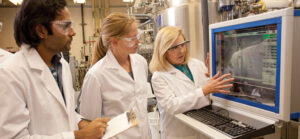 Combine the principles of biology, chemistry and engineering to develop high-value products from biochemical processes for a variety of applications including biodegradable polymers, clean fuels, nanomaterials and biopharmaceuticals.
Combine the principles of biology, chemistry and engineering to develop high-value products from biochemical processes for a variety of applications including biodegradable polymers, clean fuels, nanomaterials and biopharmaceuticals.
What you’ll study
- Microbiology
- Kinetics & Reactor Design
- Equilibrium Thermodynamics
- Animal Cell Biomanufacturing
- Metabolic Engineering and Synthetic Biology
Careers
- Bioprocess engineer
- Project engineer
- Pharmaceutical engineer
- Research and development engineer
- Food processing engineer
- Quality control engineer
Biochemical Engineering students explore chemical changes in living things and learn how to harness the power of these changes to create new products and medicines. Biochemical engineers develop new ways to use cells, enzymes, antibodies, and other biochemical agents in industry, medicine, environmental services, and other fields. If you want to tackle global challenges related to the development of new medicines, stem cell therapies or sustainable technologies, Biochemical Engineering at UGA is for you.
Details about the specific degree and college requirements for the BS – Biochemical Engineering degree are found in the UGA Bulletin.
Program mission
Biochemical Engineering utilizes the governing principles of living systems, properties of biological materials and engineering methodology in the processing of biological materials and in processes using biological agents such as cells, enzymes and antibodies.
Program educational objectives
The following Program Educational Objectives relate to the knowledge, skills, and behaviors that UGA College of Engineering alumni with degrees in biochemical engineering should demonstrate as they move through their careers as engineers and as contributing members of society:
- Achieved a high level of technical expertise, critical thinking, and team spirit to recognize, define and innovate design solutions for biochemical processes that require integration of biochemical, chemical, physical, economic, and environmental constraints.
- Established themselves as ethically, socially and culturally perceptive leaders in their profession and their community.
- Pursued lifelong learning, such as graduate work or other continuing education.


